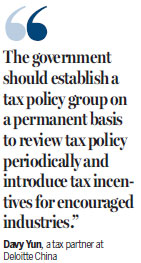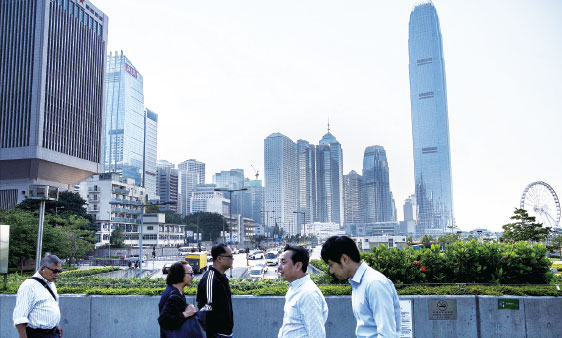Massive reserves could boost key sectors in HK
Updated: 2017-02-17 07:34
By Oswald Chan in Hong Kong(HK Edition)
|
|||||||
Business service companies call for growth hotspots to be nurtured through targeted tax incentives
With the domestic economy likely to have expanded last year at the slowest rate since 2008, Hong Kong's government should reinvigorate economic growth by leveraging its arsenal- the burgeoning fiscal reserves - to promote key segments of high-growth industries.
Specific tax incentives for the high-technology, intellectual property (IP) trading and aircraft leasing industries should be considered to foster an innovation-driven economy in Hong Kong. These measures were desperately needed for economic transformation, auditing advisory firms and professional accounting bodies believed.
The Special Administrative Region's government is set to announce the 2017-18 Budget on February 22, when it will reveal the shape of government finances for the past fiscal year. The government is tipped to record a consolidated budget surplus of HK$59 billion to HK$85 billion for 2016-17; fiscal reserves are projected to soar to as much as HK$928 billion as at the end of March.
Hong Kong's fiscal reserves continue to balloon as the domestic economy is battered by the slowdown of the mainland economy, faltering retail sales and a possible market correction triggered by imminent interest-rate increases in the United States.

There are thus strong calls for the government to harness the excess reserves to offer certain high-growth industries tax incentives to diversify the economy amid anemic growth.
On February 22, the administration will announce Hong Kong's economic growth rate for full-year 2016. GDP was estimated by the government to have expanded 1.5 percent in November, the slowest growth rate since the global financial crisis in 2008.
The new high-technology and creative industries are the first sectors in which the government should consider granting tax incentives to spur innovation in Hong Kong.
Global auditing firm Ernst & Young (EY), along with other audit and professional accounting bodies, recommends the government design the proposed Hong Kong-Shenzhen Innovation and Technology Park as a preferential tax zone.
The Hong Kong SAR and the Shenzhen Municipal People's Government last month signed an agreement to jointly develop an innovation and technology park at the Lok Ma Chau Loop. Under the deal, both sides will establish a key base for cooperation in scientific research by liaising with top-tier enterprises, research and development institutions as well as higher education institutions on the Chinese mainland and overseas.
The measures include providing a concessionary profits tax rate of 8.25 percent (half the normal rate of 16.5 percent) for qualifying enterprises; only 50 percent of the assessable income of individuals employed as high-technology or creative professionals by enterprises in the park should be subject to salaries tax.
The second batch of suggestions is to offer appropriate income and profits tax concessions to cement the growth of innovative startups and high-technology businesses.
EY proposed that if angel investors could commit a minimum of HK$500,000 in a qualifying startup, they would then be entitled to enjoy a tax deduction of 50 percent of their investment at the end of a three-year holding period, subject to a cap of HK$1 million for each year of assessment.
Deloitte suggested a 10-percent concessionary profits rate for the initial 5 years for qualifying high-technology start-ups (80 percent of employees should be Hong Kong residents and annual local spending on high-technology business activities should exceed HK$5 million).
The third type of recommendations is to provide tax incentives to encourage research and development in Hong Kong.
Related measures proposed by EY include allowing a super tax deduction of 200 percent for qualifying R&D expenditure and allowing super tax deduction of 150 percent for employee training costs paid to accredited providers of training services.
"It is through continuous innovation that more high-paying jobs will be created in Hong Kong which, in turn, will help to propel economic growth in a sustainable manner and create opportunities for upward social mobility," EY Hong Kong and Macao Managing Partner Agnes Chan envisaged.
EY's peer company Deloitte recommended that the government introduce a super deduction by allowing a 200-percent tax deduction on qualifying R&D expenditure on high-technology business activities; deductible expenditure should include external costs and fees paid to all research institutes.
"The government should establish a tax policy group on a permanent basis to review tax policy periodically and introduce tax incentives for encouraged industries," said Davy Yun, a tax partner at Deloitte China. "Currently, the Financial Services and the Treasury Bureau and the Inland Revenue Department only conduct tax reviews in a piecemeal manner which may not be able to cope with changes in Hong Kong's economy."
Two other professional accounting bodies - the Hong Kong Institute of Certified Public Accountants (CPA) and the Association of Chartered Certified Accountants (ACCA) - also supported a super tax deduction for qualifying R&D expenditure and appropriate cash rebate for designated expenditures incurred in the innovation industry.
The Hong Kong Institute of CPAs urged the Hong Kong government to establish the city as an IP hub so it could remain ahead of the curve by positioning itself at the high end of the industry value chain. Related measures include allowing deductions when R&D activities are sub-contracted outside Hong Kong but control and risk-taking activities remain in the city, as well as expanding the range of tax-deductible IP rights.
EY recommended royalties derived from IP rights created or developed in Hong Kong and licensed for use outside Hong Kong should be subjected to a concessionary profit tax rate of 8.25 percent.
Auditing firm PricewaterhouseCoopers (PwC) said the government should also explore the possibility of relaxing the restriction imposed on tax depreciation allowances of the Inland Revenue Ordinance Section 39E to enhance aircraft leasing operations in Hong Kong.
"Aircraft finance and leasing will be an additional piece of the jigsaw of financial services in the city. It will provide new job opportunities and attract highly skilled people to Hong Kong," asserted Clarence Leung, asset finance and leasing director at PwC HongKong.
oswald@chinadailyhk.com
|
Amid a subdued economy, faltering retail sales and rising interest rates, there have been mounting calls for the Hong Kong government to grant tax incentives for certain high-growth industries to help buttress the growth of the innovation sector and enable the local economy to grow rapidly. Justin Chin / Bloomberg |
(HK Edition 02/17/2017 page8)
